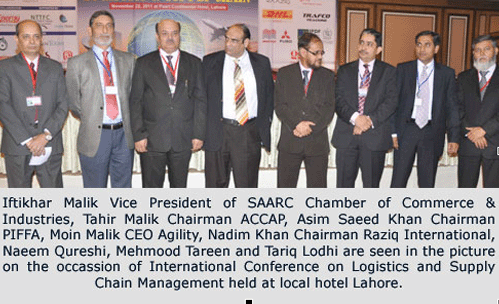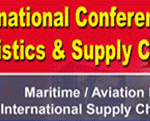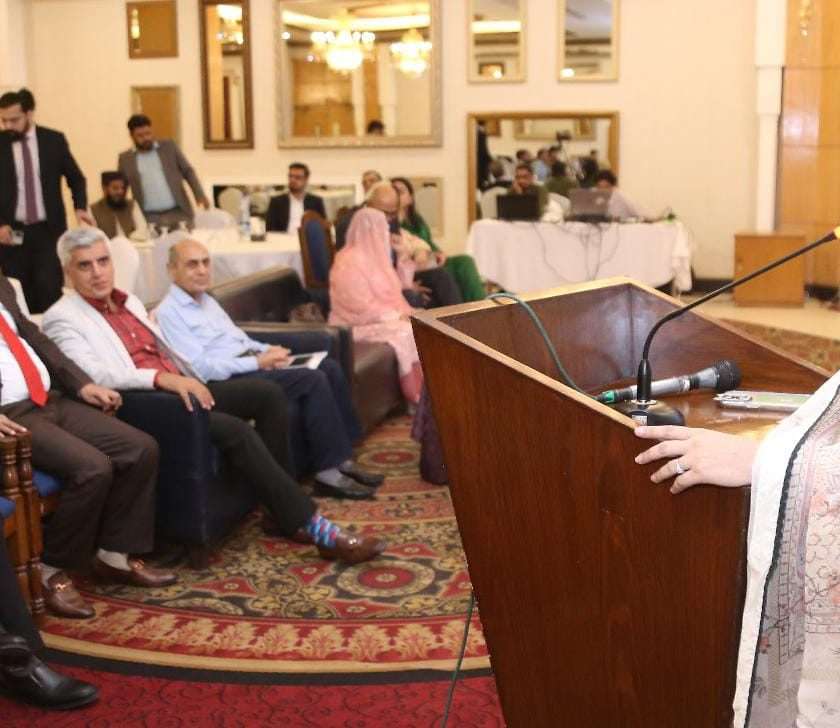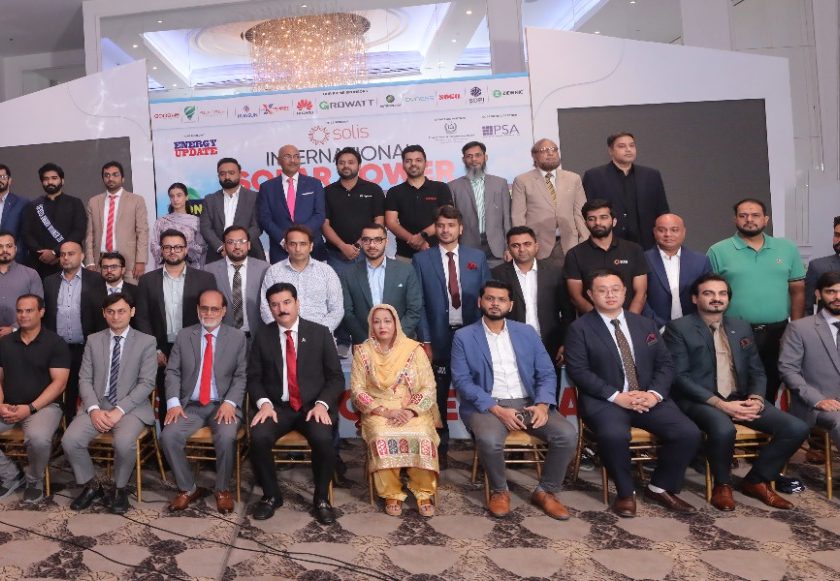
International Conference On Logistics And Supply Chain Management
Govt’s Negligence causing loss of 2% of GDP annually
Karachi: Pakistan ’s leading logistics and supply chain management experts have observed that the government’s lack of support to the logistics and supply chain management has been causing a loss of 2 per cent of the Gross Domestic Product (GDP) per annum.
They were addressing participants of 1st International Conference and Exhibition on Logistics and Supply Chain Management jointly organized by Pakistan International Freight Forwarders Association (PIFFA), Air Cargo Agents Association of Pakistan (ACAAP) and Publicity Channel here at a local hotel on Tuesday. Vice President of SAARC Chamber of Commerce & Industries Iftikhar A. Malik inaugurated conference. Iftikhar A. Malik, while speaking as chief guest, termed the logistics and supply chain as the lifeline of economy in the country. He said that floods had damaged the road infrastructure, which inflicted a heavy loss on road transportation of goods.
However, he also expressed his concern over lack of initiative on the part of business community to improve the air, sea, and rail and road logistics and supply chain system in the country. He urged the private sector to get up and face the challenges rather than looking for shortcuts whether the government would come forward and strengthen the logistics and supply chain management in the country. “If a warehouse can be established across the border, then why freight forwarders are sleeping here,” he wondered, adding that business community needed to minimize the inventory and become doer and deliverer.
While outlining the problems faced by the logistics and supply chain management, Moin Ahmad Malik, a leading logistics expert and former PIFFA Chairman, revealed that India had been ranked on top as the logistics hub owing to implementation of government’s supportive policies and decisions taken at the right time, while Pakistan was positioned at the bottom among the attractive logistics hub in the South East Asian countries. Although the trade with India will open opportunities but, he believed, the border facilities were least facilitating the regional trade. He said that the imports were much higher than exports causing trade deficit.
He said that Railways couldn’t even cater passenger transportation leave alone freight transportation within the country. He said that the only available option of goods transportation was through trucking system, which he believed, had also been disintegrated after the present government withdrew previous government’s waiver of 16 to 17 per cent on trucking, which increased the cost per trucking unit up to 100 per cent i.e. Rs 1.7 million per year. He said that trucking was an un-organized sector and corporate sector was not ready to take over this mode of transportation for the simple reason that government had completely ignored this sector.
“The government policies reflect progress one step forward and five steps back in this sector,” he said, adding that rising cost of fuel/diesel and electricity coupled with decades old trucks and bad road infrastructure were badly hurting the progress of this sector.
He said that up to 30 to 35 per cent of the perishable goods like fruits and vegetables during transportation from farm to market were lost due to lack of cold chain system. He emphasized the need to prepare trained human resource by establishing vocational training institutes to streamline road transportation sector in the country.He stressed the need to make legislation to regulate carriage of goods through air, sea, rail and road routes within and outside the country. “It will help put in place a regulatory mechanism for transport logistics and supply chain in the country,” he stressed, and urged the government to recognize the freight forwarding as an industry.
Tahir Malik, Chairman ACAAP, also criticized the government for failing to cater to improve the air freight to support business community, which was contributing billions in taxes every year. He said that the national carrier didn’t have a single cargo aircraft, no proper cargo complex was built in Pakistan till 2001 in addition to non-availability of shells at air freight units for perishable goods, which resulted in decay of a large quantity of items like mangoes and kinnos as well as pilferage.
Due to lack of facilitation in air freight by the government, he said that the business community was inclined to go for foreign carriers and providing a business of $ 1.5 billion per annum to various foreign airlines. He stressed the need to establish a proper cargo complex to house costly export goods including leather, textile, surgical and sports goods as well as livestock. He emphasized upon the government to take this industry seriously to generate revenues and also recognize freight business as an industry. “We can become world leader in air freight due to government’s support but are lagging far behind due to lack of it,” he lamented. Lahore Chamber of Commerce and Industry (LCCI) President Irfan Q. Shaikh also stressed the need to remove impediments in the way of logistics and supply chain management, which would be of paramount importance in trade with India and Afghanistan . “The role of trucking will increase up to four times with the collapse of rail freight in the country,” he added.
However, he stressed upon the private sector to take over freight trains to avail the cheapest mode of cargo transportation, which would also improve the networking in rural and urban areas in the country. Muhammad Nadeem Khan, another leading logistics expert, underlined the need to follow the modern trends and technologies to facilitate the consumers and capture the market. He advised the traders and business community to facilitate the customers on the Internet, social networking sites with relevant information and form virtual and digital contacts to meet the market requirements in a more effective manner. He was also of the view that attacks on NATO containers on the way were extremely disastrous for the poor transporters because such acts of sabotage were not doing any harm to NATO, which made payments to the transporters after reaching the destination.
Besides, Vice President FPCCI Amir Atta Bajwah, Chairman PIFFA Asim Saeed Khan, President SCAP Muhammad Qayser Alam, Publicity Channel CEO Naeem Qureshi, Conference Director Mehmood Tareen, Amer Zafar Durrani and others also addressed, while experts of various relevant businesses attended the conference. Besides, various leading national logistics and supply chain management companies set up their stalls on the occasion.
URDU TRANSLATION








